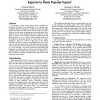90 search results - page 7 / 18 » Exploiting Symmetry in Relational Similarity for Ranking Rel... |
WWW
2001
ACM
14 years 7 months ago
2001
ACM
In response to a query a search engine returns a ranked list of documents. If the query is on a popular topic (i.e., it matches many documents) then the returned list is usually t...
WSDM
2010
ACM
14 years 4 months ago
2010
ACM
Knowledge-sharing communities like Wikipedia and automated extraction methods like those of DBpedia enable the construction of large machine-processible knowledge bases with relat...
WWW
2007
ACM
14 years 7 months ago
2007
ACM
Semantic similarity measures play important roles in information retrieval and Natural Language Processing. Previous work in semantic web-related applications such as community mi...
ECIR
2006
Springer
13 years 8 months ago
2006
Springer
Motion capturing has become an important tool in fields such as sports sciences, biometrics, and particularly in computer animation, where large collections of motion material are ...
CORR
2008
Springer
13 years 6 months ago
2008
Springer
The LETOR website contains three information retrieval datasets used as a benchmark for testing machine learning ideas for ranking. Algorithms participating in the challenge are re...

